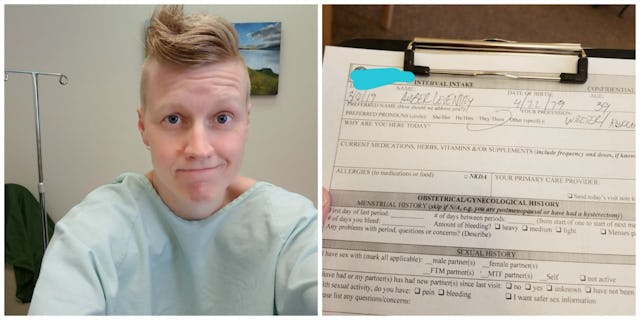We Need More OB/GYN Clinics Just Like This (ASAP)

I saw my gynecologist recently for my annual visit. While I was not looking forward to the breast exam, pap smear, crinkly paper on my bare ass, or invasive vaginal exam, my appointment was affirming and downright refreshing.
As a queer, nonbinary person, walking into any space that requires me to declare my identity causes a lot of anxiety. I am not alone in feeling uncomfortable when walking into a doctor’s office. After all, we are there for our health, and without good health the rest of our lives will suffer. Even if it’s for preventative care, the possibility that something is wrong with us is a very real stress; no one needs the extra tension of being misgendered or talked to in a way that makes you feel small, less than, or triggered.
I purposely go to a LGBTQIA+ friendly practice to avoid this, but if all practices adopted their attention to care, everyone would get what they need and deserve.
The tone is set with the greeting. When I walk into what many people would call a women’s OB/GYN clinic, no one assumes I am a woman. The intake form asks me my preferred name and pronouns. With one simple question, I know my comfort is valued and my identity is respected. Even if no transgender person walks through their doors, my doctor’s office is normalizing the idea that we should not only ask someone how they want to be addressed, but that we need to let go of the assumption that all people who walk in for gynecological care identify as female.
There are many transgender men who have a uterus, a vagina, and breasts. Being transgender does not mean a person has to have surgery to be and express their true gender. But having body parts that don’t feel right can cause a lot of dysphoria for some transgender and nonbinary folks like myself. My doctor knows this. We have talked about gender affirming surgery, but I am not in a position to schedule anything right now.
When my doctor stops to check in and acknowledges the fact that I do not like my “female” body, she is also evaluating my mental health. I don’t expect my gynecologist to also be my therapist, but she is a medical professional and I expect her to have an understanding of mind-body connections and how those affect our mood and our health. You should absolutely expect this from your doctor too. Before getting into ailments and alignments of the physical body, a doctor best serves their patient by understanding the mental wellbeing of the patient sitting before them. I don’t get special treatment because I am queer; I receive human decency because I am deserving of it.
Staff, nurses, and doctors at my OB/GYN office seem to think of everything that could trigger a person and then find ways to make it better, even consensual. When the nurse was updating my records before my doctor came in, she asked if I wanted to be weighed. When I said that was fine, she then asked if I wanted to know the number. Many of us carry the numbers that determine our weight with heaviness and shame; knowing what the scale reads often triggers some level of dysphoria or false sense of self. This is not unique to folks in the LGBTQ community, but because my providers are aware that queer folks struggle with body positivity, they asked the right questions. This bleeds into questions about sex, safety in my relationships, and menstruation.
They continued to keep my experience in a vulnerable situation a safe and validating one. This was most evident before my physical exam started. My doctor used very clear descriptions of where and when I would be touched and why. She asked permission to touch my body. Just because I was there to have an exam didn’t mean I couldn’t say no or that I wasn’t ready. I was always in control. My body, my choice, my comfort.
It is especially hard for LGBTQ folks to feel safe and respected in medical settings, so we often put off taking care of ourselves the way we should. It’s exhausting and scary to explain and defend ourselves. It’s crippling to not find places to fit when forms want to know our gender, sex, and sexual orientation. These are core pieces of who we are, yet the assumption is often that we are part of the heteronormative world of cisgender, straight people with assumed pronouns and sexual histories. How can we focus on our physical care if our headspace is occupied by self-doubt, frustration, and fear?
Finding a practice that respects my pronouns means I will be able to focus on the questions and information regarding the actual reason for being in that space. And finding a practice that radiates empathy when I need to have a breast exam done on breasts that I don’t want and that cause me severe depression means I am able to still be sure they are healthy.
No one wants to have their cervix scraped for precancerous cells, but those of us who need gynecological care deserve to have the experience be comfortable despite the uncomfortable nature of the visit. People would seek appropriate care more often and sooner if their OB/GYN office was inclusive and affirming. If all practices treated patients as if they identified somewhere along the LGBTQIA+ spectrum, then all patients—no matter their gender or sexual orientation—would receive inclusive and compassionate care.
This article was originally published on